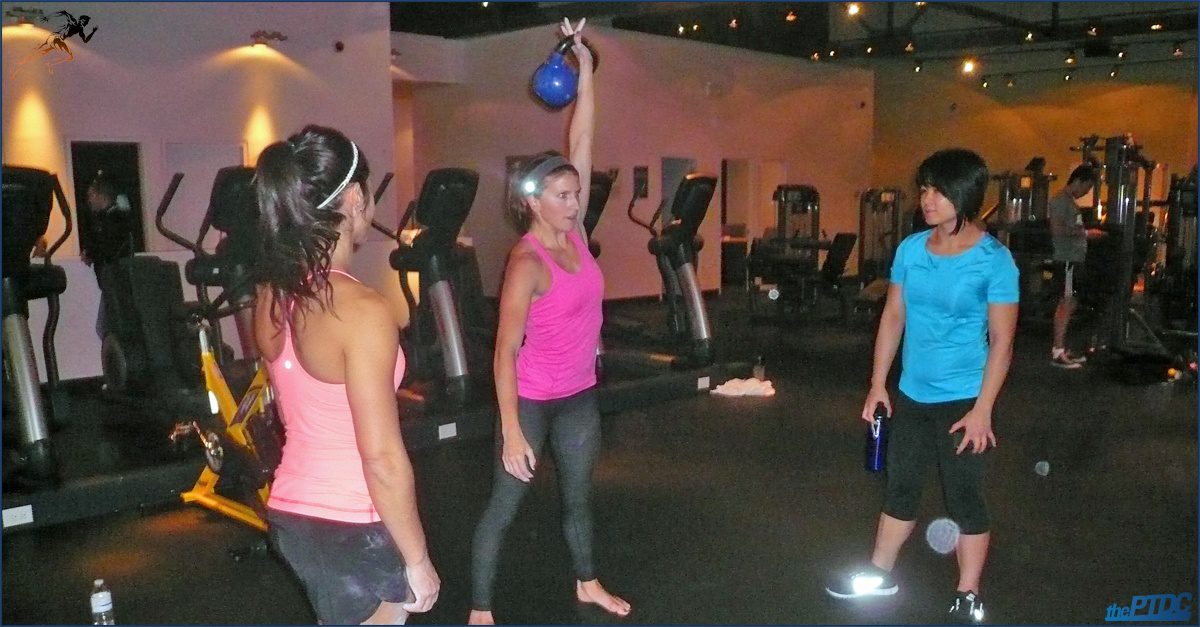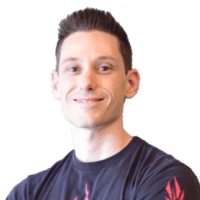One of the best pieces of advice given to new trainers in the fitness industry is to invest in their continuing education. While this sage advice is worth its weight in gold, it also fails to provide any direction -- which is what most burgeoning professionals really need.
There have never been so many roles for the fitness professional to fill as there are right now and that has led to a plethora of continuing fitness education opportunities.
We know that we need to learn, but what?
To be successful we must have a way to evaluate the knowledge we add to our repertoire, similar to how we measure exercises and concepts against our personal training philosophy. Using the three questions below you can add value to your business and save money by choosing the continuing professional education path that best fits your needs.

Some impromptu coaching from PTDC coach Neghar Fonooni at a previous PTDC seminar.
3 Ways to Evaluate Continuing Education Opportunities
1. Does This Opportunity Fit into My Career Plan?
When I first started as a trainer I never really considered how I might turn fitness into a long-term career. Like most, I knew that I loved helping people enjoy exercise and the host of benefits that it brings. However, career success in this industry requires clarity so a plan can be made.
Don't have a plan? Try this:
I want you to take a moment to close your eyes and imagine what the perfect work day would be like for you in 2 years, 5 years, and 10 years.
- Are you training clients?
- Are you teaching others trainers?
- Are you running a gym?
- Maybe all those things?
Be as specific as possible and then write all those things down on a piece of paper. Next, write down all the skills needed to perform those tasks. For example:
Training clients -> Programming, motivational/coaching skills, exercise knowledge
Running a gym -> Marketing, accounting, sales, leadership
Now, compare your current skill set to those that you will need for your ideal career position. It's unlikely that you will possess mastery over all of these qualities now, so I recommend seeking out ongoing learning opportunities to improve the areas that you're lacking, starting with the skills that you're worst at. Make sure to go back and compare yourself periodically to see how far you've come.
Also, take into account the speaker or presenter on the topic. If there's someone out there already doing exactly what you want to do with your career then you should prioritize learning from them. Chances are, they can give you incredible insight into what you'll need for development and they may be willing to help you get there.
2. Will This Learning Opportunity Improve One of My Core Areas?
There are 3 core areas of knowledge that fitness professionals need to focus on:
Training Hard Skills - This is where most trainers spend the bulk of their education time. Skills such as exercise selection, programming, cueing, and learning new training tools fall into this category and it's what most people think of when mentioning "continuing education." While this category of professional education is important and very appealing due to the excitement and participation, it's still only one piece of being a complete professional.
Training Soft Skill - Soft skills pertain to psychology(transtheoretical model), motivation (motivational interviewing), and non-physical coaching. If hard skills are the ability to develop the plan, soft skills are the ability to get the client to adhere to it.
To be proficient in this area requires the study of psychology, an understanding of the human condition, habits, and empathy. Often, professionals neglect this area, as it requires quite a bit of mental flexibility and reflection. This is a mistake, however, because, PTDC head coach Jonathan Goodman states in his book, Ignite the Fire: The Secrets to Building a Successful Personal Training Career (Revised, Updated & Expanded) it doesn't matter how good the program is if you can't get the client to follow it.
Business Development - This area is dedicated to the study of personal training sales, personal trainer marketing, operations, and finance. If there's one area that fitness professionals struggle, it's here. While most became trainers because we love helping people, we have to take care of ourselves financially to do so. By learning to get more personal training clients and charge appropriate rates you are able to spend time with your family and keep yourself financially fit. Therefore, it's imperative to learn how to scale and run your business successfully.
You can think of these three areas of knowledge as spheres that overlap each other. In the center of where they all intersect is where the complete fitness professional lies. Don't spend all of your time developing one area; instead, make sure you are working on them all equally.
3. Will This Opportunity For Learning Bring More Value to My Business?
Have you ever heard of the term "ROI?"
ROI stands for "return on investment" and in the business world, it's the king of all metrics. Simply speaking, your ROI is how much benefit you received from something that you purchased or did.
In ongoing education, you're trying to measure how much the information you received from the event/item benefitted you in contrast to the time and financial investment that it cost you. A book, for example, has a very low cost investment and a low time investment, but can deliver critical information to improve your business. That would make it a high ROI if the information was useful.
On the other hand, a seminar or top personal training certification could cost you thousands of dollars, but provide you mediocre information and a piece of paper. Unless the certification is very recognizable to the end client or could position you as an expert, there's a potential that this could yield a low ROI.
Which brings me to the most important point about ROI: Your return on investment is relative to your needs. Regardless of how inexpensive or expensive some information is it's worthless if you can't use it. Likewise, some information can be priceless if you can put it into practice immediately and deliver better results.
That's why you need to think critically about YOUR business and make investments in ongoing fitness education that will directly benefit it. A weekend workshop on training athletes may sound exciting and appeal to you personally, but if you only train general population clients then it may not be the best option. Instead, pick something that will allow you to bring more value to your clients immediately and watch your business grow.
You Need to Have a Plan
To be a successful fitness professional, ongoing education and new learning opportunities are a necessity, however, that doesn't mean that you should approach learning haphazardly. By establishing a plan that is based on strengthening the specific skills that are needed for the role that you intend to play in the industry along with some critical questioning you can save money and streamline your development as a fitness professional.











